At least 200 people have died and hundreds remain missing after severe flooding struck the market town of Mokwa in north-central Nigeria, officials said Sunday.
Local authorities called off search-and-rescue operations, citing dwindling hopes of finding survivors among the estimated 500 people still unaccounted for.
The floods followed torrential rains that began Wednesday night and continued into Thursday, inundating Mokwa in Niger State, about 380 kilometers (236 miles) west of the capital, Abuja. Officials described it as the region’s worst flooding event in six decades.
Mokwa, a major agricultural and transportation hub, is home to northern Nigerian farmers who supply goods such as beans and onions to southern markets.
Emergency services said they are now focused on recovering bodies from the debris to prevent disease outbreaks. More than 3,000 people have been displaced, and critical infrastructure, including two roads and two bridges were destroyed, said Ibrahim Audu Husseini, a spokesperson for the Niger State Emergency Management Agency.
President Bola Tinubu offered condolences in a statement Saturday, expressing sympathy for affected families and residents of Niger State. He directed federal agencies to activate emergency responses and expedite recovery efforts.
The National Emergency Management Agency has begun distributing relief supplies to displaced residents.
Flooding is common during Nigeria’s April-to-October rainy season, but scientists and officials warn that climate change is fueling more frequent and intense storms. A 2022 flood disaster that killed over 600 people in Nigeria was made 80 times more likely and 20% more intense by climate change, according to World Weather Attribution researchers.
Poor drainage systems and weak infrastructure are also seen as contributing to the destruction. Mokwa local government chairman Jibril Muregi said that investment in critical infrastructure is essential to reduce future flood risks and safeguard lives.

